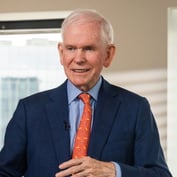In his second-quarter letter to investors, GMO Chief Investment Strategist Jeremy Grantham admits he may have been “over-intellectualizing the working of the market for a few decades.”
Why would he ever do that? “I have had too strong a belief that investors would at least be influenced by past data in a sensible way,” Grantham explained.
“The market, however, appears not to care at all about the past or to learn much from it,” he added.
This model “for sure” has been “a coincident indicator of superficially appealing variables that in a strict economic sense have been inappropriate, and that have caused spectacular and unnecessary market volatility,” the investment guru states.
The model, he points out, seems to reflect human nature.
Of all the factors influencing the market, human nature, “as economically inefficient and unsophisticated it may be, seems the least likely to change,” Grantham concludes.
His focus in the latest quarterly newsletter, though, zooms in on discussions of momentum and value and of investment sage Ben Graham’s thinking.
Momentum & Value
If short-term behavior dominates the short-term market levels at a 0.90 correlation, there should be “enough noise” to make room for many individual stocks — at least in the short and intermediate term — to be driven away from fair value by momentum.
Plus, there could be enough noise in the data “for individual stocks and the market to be pulled back toward replacement cost or fair value,” Grantham says.
“Value (like gravity in physics) is a weak force in the short term, but very, very persistent — so it can eventually work its way around the stronger coincident behavioral forces,” he explained.
Value benefits from arbitrage.
Or does it?
More recently, the corporate reflex to expand in favor of stock buybacks has been declining, and that perhaps weakens “the previously reliable game,” Grantham points out.
Back to 1963
Grantham also highlights Ben Graham’s talk “Securities in an Insecure World,” delivered on Nov. 15, 1963.
“The action of the stock market since [1955] would appear to demonstrate that these [other] methods of valuations are ultra-conservative and much too low …”, Graham explained.
With market theory, “… by the time you have had a long enough period to give you sufficient confidence in your form of measurement just then new conditions supersede and the measurement is no longer dependable for the future,” he said in his talk.








 August 03, 2017 at 10:59 AM
August 03, 2017 at 10:59 AM








